L'Homme vrai aime son pays
A Name has a Story
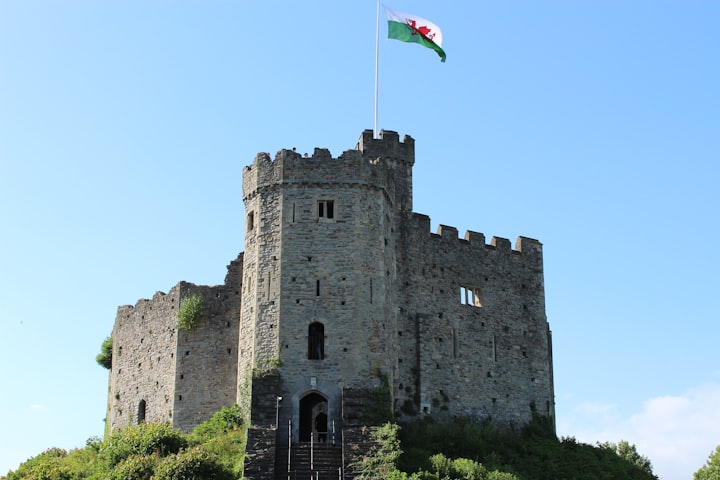
I wasn’t born in Wales, and I don’t speak the Celtic language of the people, but even as a child, fascinated by the story of King Arthur and the Knights of the Round Table, I felt in me the spirit of the Welsh bard that propagated these tales and gave life to the legends.
The fact or fantasy of Arthur was irrelevant to me, and it remains so even today. Equally intriguing to me as the story itself was the origin and advancement of the tale. For eats and ale, these talented storytellers told of monsters and magicians, wars and warriors, demons and damsels and the hero kings and knights. They were more than just entertainers; they were news anchors. They were the CNN of their time; only I would have believed a bard.
I’m sure Cymru isn’t the only national origin of the bard, but truth or lore, among the earliest compilation of stories regarding King Arthur is in the Annales Cambriae, the Latin for Annals of Wales. Later William of Malmesbury and Geoffrey of Monmouth made medieval bestsellers of the stories and even Geoffrey Chaucer was thought to have modeled his Canterbury Knight from Arthur. Today there are literally hundreds of books, live theater and film adaptations of Arthur as well as thousands more Arthurian inspired stories spanning all entertainment platforms. For this, we have the storytelling prowess of the Welsh bard to thank.
Of course, there must be more to my assumption of the moniker The Bantering Welshman than just an admiration for the legendary storytellers – and there is. The name was first levied on me 20 years ago, while stationed in Germany, by a friend and colleague, in a friendly jab at my quest to learn the origins of my family name, Humphreys. I recently returned from a week of discovery in Wales and was eagerly sharing with him what I learned. He jokingly tagged me with the name and I immediately loved it.
Originating from the French l’homme vrai aime son pays – the true man loves his country – the phrase is itself a short story about the Celtic Welsh displaced from their homeland by invading Saxons but returning with William the Conqueror in 1066 to take it back. Armed with that knowledge then, I had planned to visit the Red Dragon for more than a year. Ahead of my trip, while in command of a company of Army Engineers, I was actively searching for more information regarding where the Humphreys largely resided in the old country. Unfortunately, there wasn’t as much online information in 2001 as there is today, and ironically, Great Britian had recently allowed Northern Ireland, Scotland and Wales to restructure their local administrations back to an old Celtic system which had all historical records in upheaval. My trip was scheduled, but other than knowing the name Humphreys was Welsh, I had no idea where to go.
Anxious to be on my quest, I landed in London on the afternoon of November 5, 2001, and quickly made my way to the train station for the four-hour trip to the port town of Conwy. With the belief that my name was from Northern Wales, I planned to begin my search there. It was dark early this time of year so I anticipated a restful train trip as there would be nothing to see out the window into the blackness of the English and Welsh countryside. However, soon after leaving the lights of London behind, I began to notice countless bonfires of varying degrees illuminating the landscape. Some of these fires were quite large and a few were close enough to the tracks that I could see large groups of revelers partying around it as we sped past. I immediately thought of St. John’s Fire, or St. Johannes Feuer as my friends in Germany called it, but that coincided with the Summer Solstice; This was mid-Autumn.
Well toward the train’s final stop, the majority of travelers had already exited. With only a few of us remaining on board, a local noticed my inquisitive glances through the window at the fires.
“It’s Guy Fawkes night,” he said collecting my attention though doing little to educate me on the meaning. From my furrowed brow, I gathered he could sense my confusion.
“The Gunpowder Plot of 1605,” he continued. “He tried to blow up the bloody Parliament.”
“Your Parliament?” I was still confused.
“The English,” he responded.
“They celebrate that here,” I asked trying to understand why they would celebrate an act of treason against their own country.
“Aye!” The man chuckled. “There are plenty in these parts wished he’d done it... a few more that would do it today.”

It was already getting late when I finally rolled into Conwy, a little more enlightened into Great Britain’s centuries old socio-political strife. That would call for more study later. Right away I needed food and beverage. I quickly found a B&B in town, dropped my gear then walked around the corner to the closest watering hole I could find for a meal and a traditional Welsh cask ale. From the door of the pub, I could see Conwy Castle built by Edward Longshanks, the same from Braveheart fame. Surrounded by thousands of years of history and culture, I resolved to have a great time here whether I discovered my family origins or not. The spirit of the bard was with me though because all I had to do was tell folks my name.
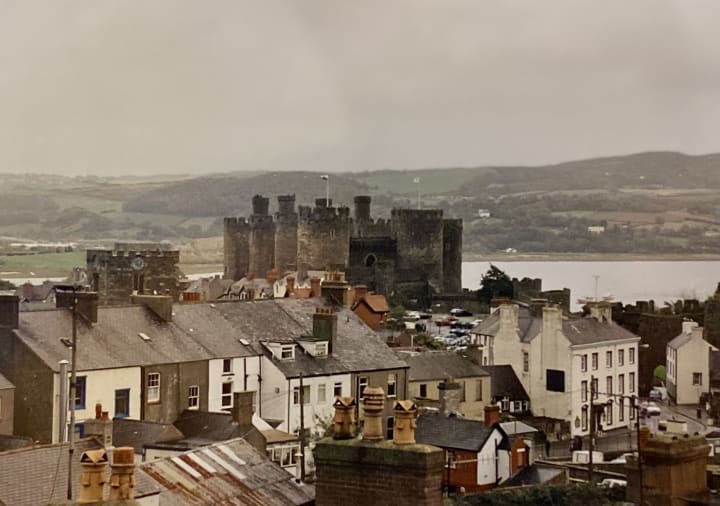
“Humphreys? Well, that’s a good Welsh name for sure,” said the man at the end of the bar after he overheard me tell the romantically inclined bartending couple my name and mission.
“Thanks,” I responded. “You wouldn’t happen to know where it comes from would you?”
“Well, as a matter of fact,” he said pausing with his fork full of food halfway to his mouth, “My wife is a genealogist.”
“Are you serious?” I was elated.
“Yes! And I think she would say your family comes from Ceredigion, south along the coast.”
“Well, there ya go,” said the cute lady-half of the bartending couple. “Bob here eats with us about twice a week. Good thing you came in tonight.”
It was heaven sent is what it was. Of all the bars and pubs in this little city of Conwy, I found a B&B next to this one and not wanting to travel far from my bed on this first night in Wales, I take my supper here and meet Bob, the friendly barstool pigeon husband of a Welsh genealogist. Bob finished his meal and poured the last of his refreshing cask ale down his throat before standing to take his leave.
“Hwyl am rwan,” Bob said for my benefit as he stepped out into the chill of the evening before the rain started again as it was oft to do in coastal Wales this time of year.
“Hwyl!” The bartenders said with a wave of their arms.
“What was that?” I asked.
“That’s Welsh for goodbye.”
I didn’t delve much further into the Welsh language as I found the pronunciations beyond the physical manipulation of my tongue and vocal cords, but I enjoyed listing to it, nevertheless. I was fascinated to learn that there was significant effort throughout the English-speaking country to preserve the ancient language and that it was commonplace for locals to speak among themselves in the old tongue. I was delighted in my conversation with the bartending couple and sat for hours enjoying the rich flavor of several more pulls of the cask ale even after I finished my meal. It was a good thing I stayed.
About an hour and a half later, Bob stumbled back through the pub door looking wet and disheveled having been caught in a shower.
“Glad you’re still here,” he said slightly out of breath and shaking the chill from his limbs. “I was cozying up to a hot toddy when my dear Lowri came home. I was so proud that I met you tonight and gave you advice that I rushed to greet her with the news.”
By the way he despairingly closed his eyes and shook his head, I understood the earlier exchange with his wife did not go well but couldn’t understand why his Lowri would have been so displeased.
“I told her that I pointed you in the direction of Ceredigion,” he said still shaking his head. “Christ! You’d think I pissed on her mother’s grave. She slapped me in the chest and screamed ‘Bloody Hell! That isn’t where the Humphreys come from you blooming ID’YOT!’”
“Oh no!” I said as the bartenders laughed.
“Ah, it happens all the time. I am a blooming id’yot... Anyway, she made me come back down here to find you and tell you that Blaenau Ffestiniog in Gwynedd is where your family hails from. It’s an old slate mining town smack in the middle of Snowdonia”
“I’m sorry you had to come back down here, but thank you so much for doing it,” I said.
“Ah, no problem,” he responded. “You probably won’t find much in Blaenau these days. Kind of a ghost town really, but Dolgellau is just down the road. It’s the old county seat for Merionethshire. They are likely to have some records.”
I thanked him again.
“Aye, guess I’ll be on my way again. Hwyl!” He said as he disappeared through the door back into the night.
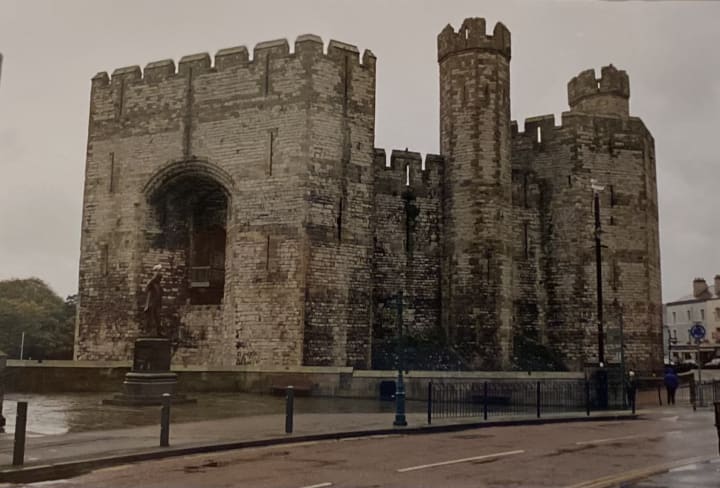
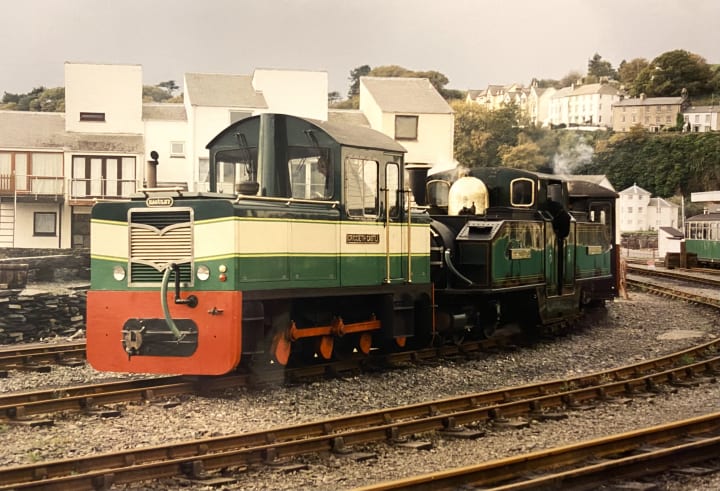
After my first night in Wales, I finally had a direction that would lead me to the treasure I came here for. I did a little studying of the maps and sites in the lobby of the Castle Hotel that night and discovered that I could take an historic steam engine tour of Snowdonia National Park from Porthmadog right into downtown Blaenau. Early the next morning, I had a hearty Welsh breakfast then boarded a bus to Porthmadog by way of Caernarfon, where I stopped to tour another of Edward’s castles. For all the remaining animosity toward the English, there sure is plenty around her to constantly remind the Welsh of the English Monarch that conquered them.
In Porthmadog, I found the schedule for the next day’s train to Blaenau and turned in for the night. I’m sure I dreamt of a crowd of Humphreys gathered at an iconic train station in the hills of Snowdonia welcoming home a wayward son, but reality was far from the dream.
I woke early in Porthmadog and found a greasy spoon to have breakfast in before catching the train. I remember the waitress politely sashaying up to take my order. She leaned against the high back of the booth opposite me and spat something unintelligible at me. I gave her my best deer-in-the-headlights look then she switched to Her Majesty’s English.
“What can I get you hon,” she asked.
After breakfast, I bundled up against a cold day, threw my pack on my back and boarded an open car on the Ffestiniog Rail bound for Blaenau. It was breezy and snowy in the forested hills of Snowdonia, but the scenery looking out over the patchwork land of Gwynedd was worth it. There were no throngs of Humphreys at the sleepy little train depot when I got to Blaenau. Not even the handful of chilled travelers with me on the train did much to add to the traffic on the town streets when they debarked. Outside the normal tourist season on a cold and blustery day, there were very few open businesses and hardly any lodging available. Blaenau really was a ghost town.
I darted into the town’s post office just before the postal officer closed for lunch to ask about a registrar. I had hoped to jot down some names of Humphreys still living in this sleepy mining town. I was in the right place he told me, but the registrar only works on certain days, and it so happened that this day was not one of them.
“I’m American,” I told him for which he shook his head in acknowledgement of the obvious. “My name is Humphreys and I’m looking for the origin of my name.”
“Aye, there are plenty of Humphrey here,” he said. “More than a few.”
“Is there someplace I can see records,” I asked.
“Dolgellau,” is what he said though as usual, it was unpronounceable to me.
He laughed as I tried to regurgitate the word so I could explain to a driver where I needed to go.
“There is a bus leaves from the corner at four,” he said. “He’ll know what you are trying to say.”
With a few hours to kill, I decided to pay a visit to Europe’s steepest cable railway into the Llechwedd Deep Mine. By the end of the 19th Century, Wales was supplying much of the worlds slate for roofs and other applications. The slate mining industry in Wales at one time employed more than 17,000 men. As I descended 500 feet below Moelwyn Mawr, it occurred to me that many of my ancestors probably worked these mines.
I purchased a few slate trinkets from the gift shop to remind me of the industry of the Welsh Humphreys then hurried back to town to catch the last bus out lest I get stuck here. I crossed the road diagonally just as the bus came to a stop. The driver opened the door and I greeted him with my best attempt and mimicking the guttural sounds I heard others repeat for the word Dolgellau.
Just as the post officer had said, the bus driver laughed and said, “Yes, that’s where we are going.”
Every interest that Blaenau Ffestiniog lacked, Dolgellau had in abundance. For me that night, the bus had been a spaceship to a time and place that I never could have imagined existed. The bus dropped me off at the edge of an ancient stone arch bridge across the shallow Wnion River opposite a Grimm Brothers Fairy Tale. Every pub, every shop, every home, road and walkway were made from thick, heavy, milled stones and of course every building was roofed in slate. Smoke streamed up from the chimneys into the cold evening air and yellow light poured through the doors and windows to illuminate the cobblestone streets. I was in a Dickens novel.
Fine food and cask ales were in abundance this night and shared in the company of a traveling American couple and friendly Welsh locals. That night when I finally poured myself into a bed, pleasantly worn out, inside a home older than the United States, I didn’t know my search for my family name had already drawn to a close, sadly unfinished.
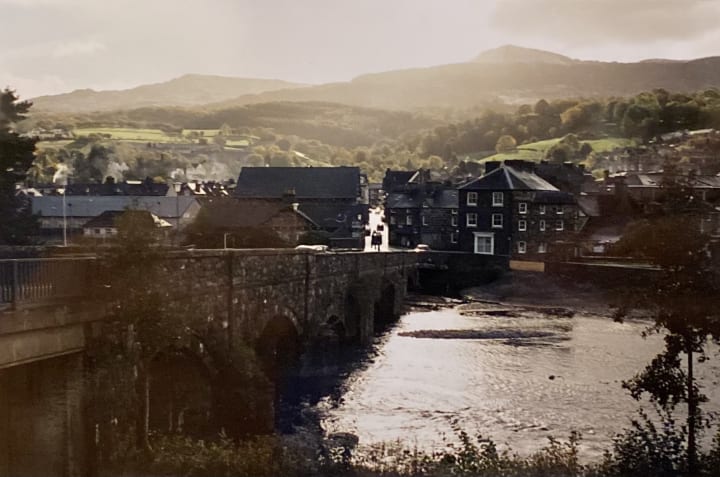
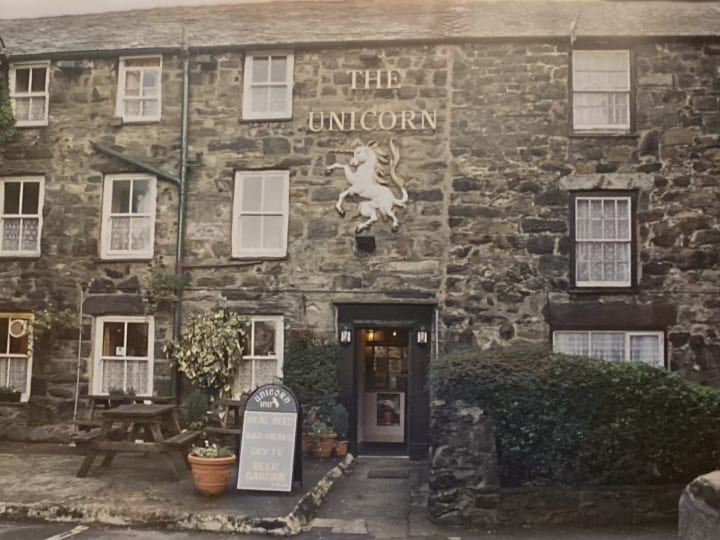
The next morning, I eagerly marched to the old county records building where I was assured local records were still stored, but found the doors locked though the posted hours indicated they should be open. A woman called down to me from an open window overlooking the front door.
“Can I help you,” she asked.
“My name is Humphreys,” I answered. “I’m hear researching my family history.”
“Oh dear,” she said sincerely. “We are closed for renovations all this week. How long will you be here?”
“Oh no. I have to be back in Germany on Monday.”
“I’m so sorry,” she pleaded. “I would let you in, but all our records are crated up at the moment I’m afraid. You wouldn’t be able to find anything if I did.”
I was literally heartbroken and damning my luck, but I graciously thanked the woman and returned across the bridge to Dolgellau to contemplate what I had achieved. I wasn’t able to tie my heritage to any specific Humphreys coming across the water to the new world, but I did find my origins. I walked the streets where many Humphreys before me had walked and lived for nearly 1000 years, and I toured the mine where I'm sure hundreds of Humphreys worked for centuries. I heard the language they spoke. I ate the foods they ate. I drank the beers they drank, and I witnessed some of the festivities they participate in. I didn’t identify any names, but even before I knew of Blaenau Ffestiniog, I said I would have fun here and at that I was very successful.
I said good by to Gwynedd and Snowdonia and spent the rest of my time in Great Britain in Cardiff and London. That was 20 years ago and I left vowing to return one day to finish the job I started. Now that I have officially publicized my pen name, The Bantering Welshman, I suppose it is about time to plan a new trip.
Hwyl am rwan!
About the Creator
The Bantering Welshman
M.S. Humphreys is The Bantering Welshman, an East Tennessee native, author, journalist, storyteller, marketing specialist, husband and step father. https://www.instagram.com/thebanteringwelshman/ and http://www.banteringwelshman.com




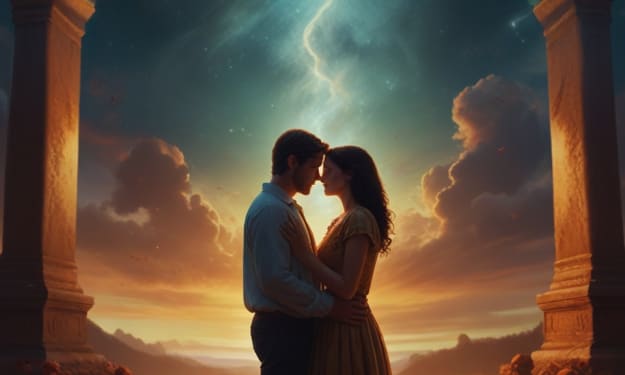

Comments
There are no comments for this story
Be the first to respond and start the conversation.